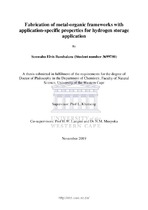| dc.contributor.advisor | Khotseng, Lindiwe | |
| dc.contributor.advisor | Langmi, H.W. | |
| dc.contributor.advisor | Musyoka, N.M. | |
| dc.contributor.author | Bambalaza, Sonwabo Elvis | |
| dc.date.accessioned | 2020-12-10T07:08:18Z | |
| dc.date.available | 2020-12-10T07:08:18Z | |
| dc.date.issued | 2019 | |
| dc.identifier.uri | http://hdl.handle.net/11394/7727 | |
| dc.description | Philosophiae Doctor - PhD | en_US |
| dc.description.abstract | The application of porous materials into industrial hydrogen (H2) storage systems is based on
their use in combination with high-pressure cylinders. The processing of metal-organic
frameworks (MOF) powders into shaped forms is therefore imperative in order to counteract
the adverse effects of poor packing of powders in cylinders. The fabrication of shaped MOFs
has, however, been shown to be accompanied by compromised properties such as surface areas,
gravimetric and volumetric H2 capacities, and also the working/deliverable H2 capacities in
comparison to MOF powders. | en_US |
| dc.language.iso | en | en_US |
| dc.publisher | University of Western Cape | en_US |
| dc.subject | Hydrogen storage | en_US |
| dc.subject | Metal-organic frameworks | en_US |
| dc.subject | Nanocomposites | en_US |
| dc.subject | Coaxial electrospinning | en_US |
| dc.subject | Core-shell nanofibers | en_US |
| dc.title | Fabrication of metal-organic frameworks with application-specific properties for hydrogen storage application | en_US |
| dc.rights.holder | University of Western Cape | en_US |

